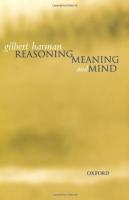
- Author / Uploaded
- Harman Gilbert
R M Hare and Moral Reasoning
R. M. Hare and Moral Reasoning Gilbert H. Harman Mind, New Series, Vol. 77, No. 307. (Jul., 1968), pp. 427-428. Stable U
1,060 14 56KB
Pages 3 Page size 595 x 792 pts Year 2007
Recommend Papers
File loading please wait...
Citation preview
R. M. Hare and Moral Reasoning Gilbert H. Harman Mind, New Series, Vol. 77, No. 307. (Jul., 1968), pp. 427-428. Stable URL: http://links.jstor.org/sici?sici=0026-4423%28196807%292%3A77%3A307%3C427%3ARMHAMR%3E2.0.CO%3B2-9 Mind is currently published by Oxford University Press.
Your use of the JSTOR archive indicates your acceptance of JSTOR's Terms and Conditions of Use, available at http://www.jstor.org/about/terms.html. JSTOR's Terms and Conditions of Use provides, in part, that unless you have obtained prior permission, you may not download an entire issue of a journal or multiple copies of articles, and you may use content in the JSTOR archive only for your personal, non-commercial use. Please contact the publisher regarding any further use of this work. Publisher contact information may be obtained at http://www.jstor.org/journals/oup.html. Each copy of any part of a JSTOR transmission must contain the same copyright notice that appears on the screen or printed page of such transmission.
JSTOR is an independent not-for-profit organization dedicated to and preserving a digital archive of scholarly journals. For more information regarding JSTOR, please contact [email protected].
http://www.jstor.org Sat May 12 00:36:26 2007
R. M. HARE AND MORAL REASONING DESPITEhis explicit statements to the contrary,l R. M. Hare is often taken to be claiming that the logic of moral reasoning is essentially part of the logic of imperatives. One excellent reason for this interpretation of Hare is, as Casteiieda has shown, that certain remarks Hare makes in T h e Language of Morals commit him to the view that " An ought-sentence is evaluative only if it is imperative ".2 But i t is not true that Hare interprets particular moral judgements of the form, " A ought to do D ", as imperatives. Hare analyses " A ought to do D " as " A's doing D is in accordance with an ' ought '-principle to which I hereby subscribe " (p. 191). Hare analyses a moral principle of the form, " Everyone in C ought to do D ", as a general imperative that we may represent as " (Everyone in C doing D) please ". Strictly speaking, then, the only moral statements that are imperatives are general moral principles. On this analysis we must not take Hare literally when he claims that, if an " ought "-judgement is used evaluatively, then i t entails an imperative (p. 168). For Hare, the relation between " A ought to do D " and " (A's doing D) please " is not strictly that of entailment but is analogous to the relation between " I believe something that entails P " and " P ". It is only by taking Hare literally a t this point that Casteiieda is able to demonstrate Hare's commitment to the identification of all ought-sentences with imperatives (pp. 226-230). How, then, are we to analyse the following argument ? (1) Everyone in C ought to do D.
A is in C.
Therefore, A ought to do D.
A corresponding argument in the logic of imperatives would appear to be (2) (Everyone in C doing D) please.
(A is in C) yes.
Therefore, (A's doing D) please.
However, the conclusion of (2), " (A's doing D) please ", is not, on Hare's analysis, the same as " A ought to do D ". If we replace this conclusion with Hare's analysis of " A ought to do D ", we obtain an argument not obviously in the logic of imperatives. (3) (Everyone in C doing D) please. ( A is in C) yes. Therefore, A's doing D is in accordance with an " ought "principle I hereby accept. Furthermore, (3) is not valid. 1 E.g. R. M. Hare, The Language of Morals (Oxford : 1952), page 2, " it is no part of my purpose to ' reduce ' moral language to imperatives." 2 Hector-Neri Casteiieda, " Imperatives, Decisions, and ' Oughts ' : A Logioo-Metaphysical Investigation " in Casteiieda and Nakhnikian (eds.), Morality and the Language of Conduct (Detroit : 1963),page 230. 427
Apparently, if we are to give an argument with the correct conclusion, we must argue as follows : (4) I hereby accept tho " ought "-principle (Everyone in C doing D) please. A is in C. If A is in C, then A's doing D is in accordance with the " ought "-principle (Everyone in C doing D) please. Therefore, A's doing D is in accordance with an " ought "principle I hereby accept. Although (4) is not based on a logic of imperatives, if (4) is taken to give an adequate account of the original moral reasoning (l),then there is a sense in which moral reasoning involves the logic of imperatives. For the third premiss of (4) may be construed as a 'remark about an inference in the logic of imperatives, saying in effect that argument (2), above, is valid in the logic of imperatives. Princeton University
GILBERTH. HARMAN









